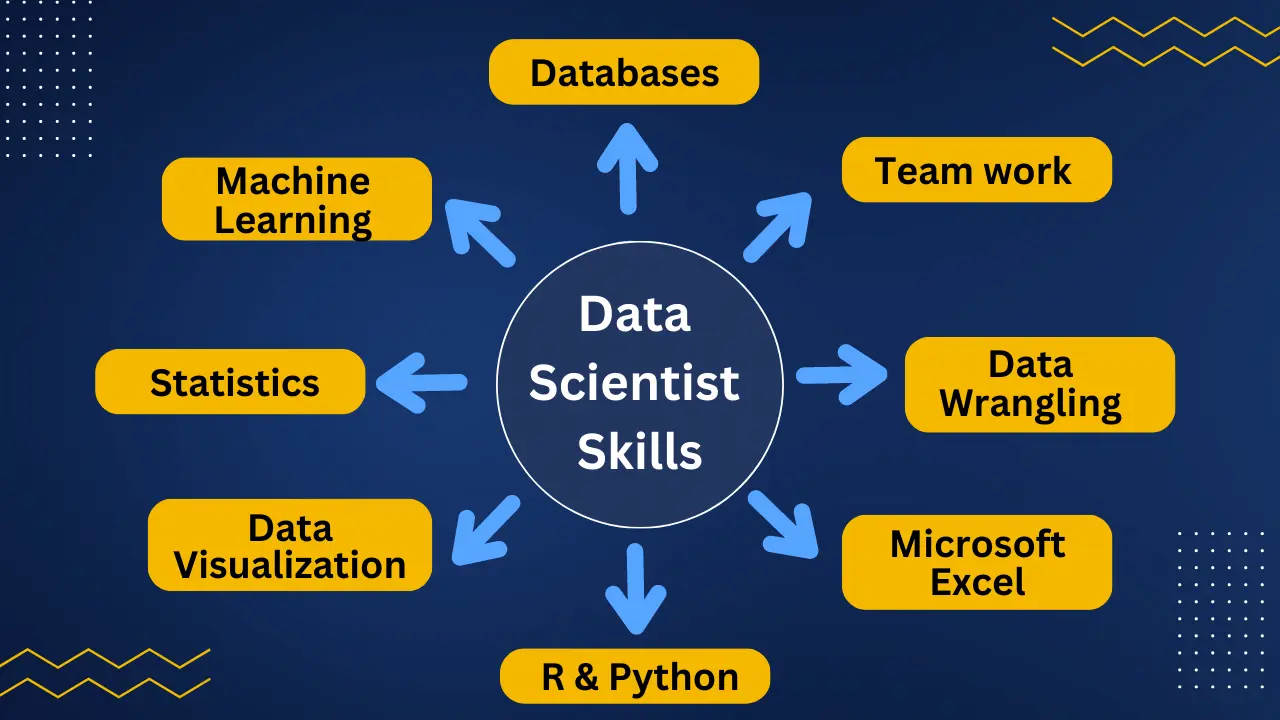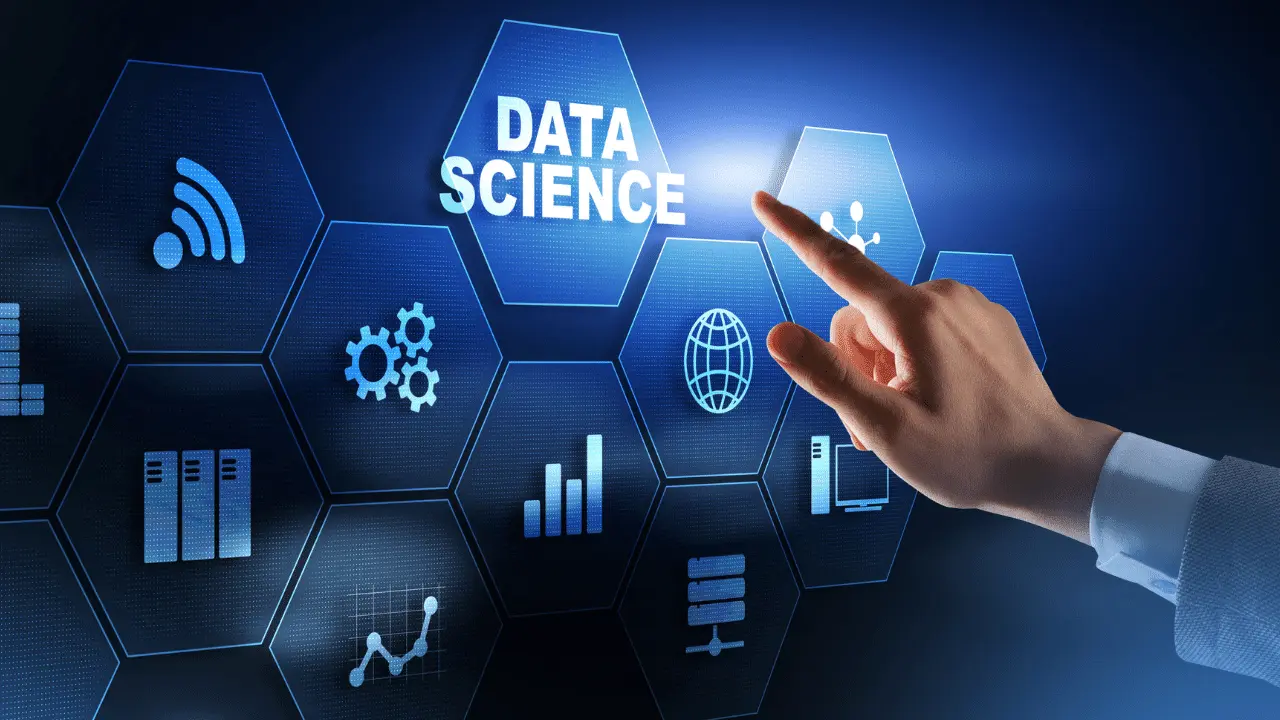What is a Data Scientist?
Data scientists are professionals who possess a unique blend of technical expertise, domain knowledge, and analytical skills. They have the ability to gather, process, and analyze vast amounts of data to uncover patterns, extract meaningful insights, and solve complex problems. As businesses across various industries strive to become data-driven, the demand for skilled data scientists continues to grow rapidly.
The Growing Demand for Data Scientists:
With the exponential growth of data, organizations across various industries are recognizing the value of data scientists. They rely on data scientists to uncover hidden patterns, optimize processes, enhance decision-making, and gain a competitive edge in the market. Consequently, the demand for skilled data scientists is on the rise.
Career Paths
Data science offers a diverse range of career paths, allowing professionals to explore various domains and specialize in areas that align with their interests and strengths. Some common career paths within data science include:
1. Data Scientist
The role of a data scientist involves designing and implementing complex data models, developing machine learning algorithms, and analyzing data to derive actionable insights. Data scientists work closely with stakeholders to understand business objectives and formulate data-driven solutions to address challenges.
2. Data Analyst
Data analysts focus on collecting, cleaning, and organizing data to uncover patterns and trends. They perform descriptive statistical analysis, create visualizations, and generate reports that provide valuable insights to support decision-making processes.
3. Machine Learning Engineer
Machine learning engineers focus on developing and implementing algorithms that enable machines to learn from data and make predictions or decisions. They work closely with data scientists and software engineers to deploy machine learning models and optimize their performance.
4. Big Data Engineer
Big data engineers specialize in managing and processing large volumes of data using distributed systems like Hadoop or Spark. They design and maintain data infrastructure, ensuring efficient data storage, retrieval, and processing.
5. Business Intelligence Analyst
Business intelligence analysts transform raw data into meaningful information by designing and implementing data models, dashboards, and reports. They provide insights and recommendations to support strategic decision-making within organizations.
Skills Required for a Data Scientist

To excel in a data scientist career, several key skills are essential:
1. Education and Certifications
Most data scientists have a strong educational background in fields such as mathematics, statistics, computer science, or a related discipline. While a bachelor's degree is often the minimum requirement, many professionals pursue advanced degrees such as a master's or Ph.D. in data science or a specialized field.
Certifications in areas like data science, machine learning, and big data can also enhance a data scientist's credentials and demonstrate their expertise to potential employers.
2. Building a Strong Foundation in Mathematics and Statistics
Mathematics and statistics form the backbone of data science. A solid understanding of concepts like linear algebra, calculus, probability, and statistical inference is crucial for data scientists. These mathematical tools enable them to develop and apply algorithms and models to analyze data effectively.
3. Programming and Data Manipulation Skills
Proficiency in programming languages like Python, R, and SQL is essential for data scientists. They use programming to clean, manipulate, and preprocess data, as well as build statistical models and algorithms. Data scientists should also be familiar with data manipulation libraries and frameworks like pandas and NumPy.
4. Machine Learning and Artificial Intelligence
Machine learning and artificial intelligence (AI) are vital skills for data scientists. They employ algorithms and techniques to train models that can make predictions, classify data, or uncover patterns within large datasets. Familiarity with popular machine learning libraries such as sci-kit-learn and TensorFlow is highly advantageous.
5. Data Visualization and Communication Skills
Data scientists must possess strong data visualization and communication skills. They need to effectively present their findings and insights to non-technical stakeholders through clear and visually appealing charts, graphs, and reports. Tools like Tableau, Power BI, or Matplotlib can assist in creating compelling visualizations.
6. Industry-Specific Knowledge
Having domain knowledge in specific industries such as finance, healthcare, or marketing can be advantageous for data scientists. Understanding the nuances and challenges of a particular domain enables them to extract meaningful insights and make data-driven recommendations.
7. Experience and Projects
Real-world experience and hands-on projects are valuable assets for data scientists. Participating in Kaggle competitions, contributing to open-source projects, or working on industry-specific projects can provide practical exposure to different data science techniques and enhance a data scientist's portfolio.
Job Roles and Career Path in Data Science
Data scientists can climb the career ladder and take on more challenging roles. Let's see what the future holds for them!
Entry-level Data Analyst:
Begin as a data analyst, where you gather, clean, and analyze data sets.
Junior Data Scientist:
As a junior data scientist, you start applying machine learning algorithms and assisting with data-driven projects.
Data Scientist:
This mid-level position involves handling complex data sets, building predictive models, and collaborating with cross-functional teams.
Senior Data Scientist:
At the senior level, you lead data science initiatives, mentor junior colleagues, and provide strategic insights to the organization.
Data Science Manager:
Transition into a managerial role, where you oversee a team of data scientists, manage projects, and set data strategy for the organization.
Chief Data Scientist:
The highest position in data science, where you are responsible for driving data-driven decision-making at the executive level.
Salary and Growth Potential
Data science offers attractive salary prospects, reflecting the high demand and value placed on skilled professionals in this field. Salaries can vary depending on factors such as experience, location, industry, and level of specialization. Generally, data scientists enjoy competitive compensation packages, with opportunities for salary growth as they gain more experience and expertise.
Moreover, data science is a rapidly growing field, with a promising future. As businesses increasingly rely on data to drive decision-making processes, the demand for skilled data scientists continues to rise. This sustained demand ensures ample opportunities for career advancement and professional growth within the industry.
Industry Demand
The demand for data scientists spans across various industries, as organizations recognize the value of data-driven decision-making. Industries such as finance, healthcare, e-commerce, technology, and marketing heavily rely on data scientists to extract insights, identify trends, and make informed strategic choices.
Data-driven organizations have a competitive advantage, as they can leverage data science to optimize operations, improve customer experience, and develop innovative solutions. Consequently, the demand for data scientists remains robust, with ample job opportunities across a wide range of sectors.
Tools and Technologies
Data scientists employ a range of tools and technologies to perform their work efficiently. Popular programming languages for data science include Python, R, and SQL, which offer powerful libraries and frameworks for data manipulation, analysis, and machine learning.
In addition to programming languages, data scientists utilize various data analysis and visualization tools such as Tableau, Power BI, and matplotlib to explore and present data in a meaningful way. Furthermore, they leverage machine learning frameworks like TensorFlow and scikit-learn to develop and deploy advanced predictive models.
Here are some of the top colleges in India that offer data science programs:
Indian Institute of Technology (IIT), Bombay:
IIT Bombay offers a comprehensive data science program with a strong emphasis on practical skills and research. They offer both undergraduate and postgraduate programs in data science.
Indian Institute of Technology (IIT), Delhi:
IIT Delhi has a robust data science program that covers various aspects of data science, including machine learning, big data analytics, and data visualization. They offer a Master of Technology (M.Tech) in Data Science and Engineering.
Indian Statistical Institute (ISI), Kolkata:
ISI Kolkata is a premier institution for statistics and data science. They offer a range of programs in data science, including a Bachelor of Statistics (Honors), Master of Statistics, and a Postgraduate Diploma in Statistical Methods and Analytics.
International Institute of Information Technology (IIIT), Hyderabad:
IIT Hyderabad has a strong data science program that covers topics such as data mining, machine learning, and natural language processing. They offer a Master of Technology (M.Tech) in Data Science.
Indian School of Business (ISB), Hyderabad:
ISB offers a Post Graduate Program in Business Analytics (PGPBA), which focuses on applying analytics to business problems. The program combines business management and data science skills.
Indian Institute of Science (IISc), Bangalore:
IISc offers a Master of Technology (M.Tech) program in Computational and Data Sciences. The program focuses on computational techniques, statistical analysis, and machine learning algorithms.
University of Delhi, Delhi:
The University of Delhi offers a range of data science programs, including a Bachelor of Technology (B.Tech) in Mathematical Innovations and Computing, and a Master of Science (M.Sc) in Operational Research and Data Analytics.
Indian Institute of Technology (IIT), Madras:
IIT Madras offers a Master of Technology (M.Tech) program in Data Science. The program covers topics such as machine learning, data visualization, and big data analytics.
Great Lakes Institute of Management, Chennai:
Great Lakes offers a full-time Post Graduate Program in Business Analytics (PGPBA). The program focuses on developing data-driven decision-making skills for business professionals.
Indian Institute of Technology (IIT), Kharagpur:
IIT Kharagpur offers a Master of Technology (M.Tech) program in Data Science and Engineering. The program covers various aspects of data science, including machine learning, data mining, and statistical analysis.
Finding the Perfect Fit: Personality-Matched Data Science Careers:
Different data science roles exist, catering to various personalities and interests. From research-focused positions to industry-specific roles like healthcare or finance, finding a niche that aligns with your passions can enhance job satisfaction and success. Exploring job descriptions, networking with professionals, and participating in informational interviews can aid in discovering the ideal data science career path.
Confused about data science as a career? ?? Discover the perfect career path for your personality, aptitude, and interest! Let our expert career counseling guide you.
Career Opportunities: Where can Data Scientists Work?

Data scientists have a lot of exciting career opportunities. Let's explore a few places where they can work their magic!
Tech Companies
Data scientists are superheroes in the tech world. They help companies like Google, Facebook, and Amazon understand their users better and make their products even cooler. It's like being part of the team that makes your favorite games and apps!
Healthcare Heroes
Data scientists also play a vital role in healthcare. They use data to find cures for diseases, predict outbreaks, and make hospitals run more smoothly. It's like having a superhero doctor who can save lives using numbers!
Sports Stats Gurus
If you love sports, you'll be amazed to know that data scientists help teams and coaches make better decisions. They analyze all the stats and numbers to find the best strategies and improve players' performance. It's like having a secret coach who knows all the tricks!
Frequently Asked Questions (FAQs)
1: How long does it take to become a data scientist?
Becoming a data scientist takes time and dedication. It usually involves obtaining a degree in a related field and gaining practical experience. The journey can take several years, but the hard work is worth it!
2: Do I need a degree to become a data scientist?
While having a degree in a field like computer science, mathematics, or statistics can be beneficial, it's not the only path. Some data scientists gain expertise through online courses, boot camps, or self-study. The key is to develop the necessary skills and demonstrate your abilities to potential employers.
3: What skills do I need to become a data scientist?
Data scientists need a combination of skills, including strong analytical abilities, mathematical proficiency, programming knowledge (such as Python or R), and the ability to communicate findings effectively. Problem-solving and critical thinking skills are also crucial.
4: Can anyone become a data scientist?
Anyone with a passion for data and a willingness to learn can become a data scientist. It requires dedication, continuous learning, and a love for solving puzzles. With the right mindset and effort, anyone can embark on this exciting career path!
5: How much do data scientists earn?
Data scientists are highly sought after, and their salaries can vary depending on factors like experience, location, and industry. On average, data scientists earn a competitive salary, and as they progress in their careers, their earning potential increases.
6: Is a data science career suitable for introverts?
While data science does require analytical and technical skills, introverts can excel in this field. Much of the work involves working with data and algorithms, which can be done independently.
7: How can career counseling help me make an informed decision about pursuing a data science career?
Career counseling provides personalized guidance based on your unique circumstances. A career counselor can help you assess your skills, interests, and goals, and provide insights into the data science field to help you make an informed decision.


